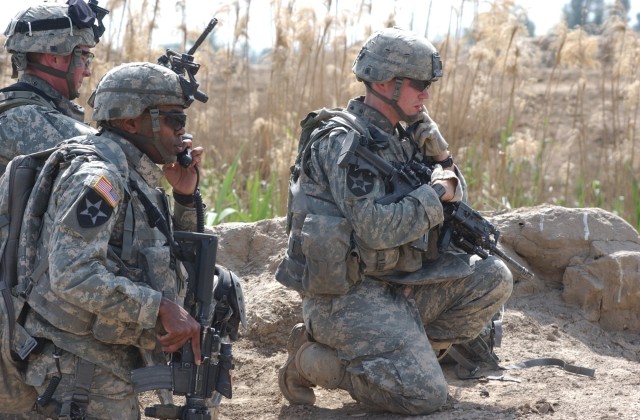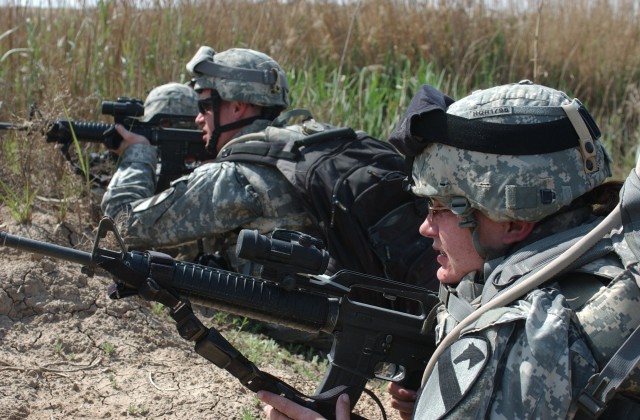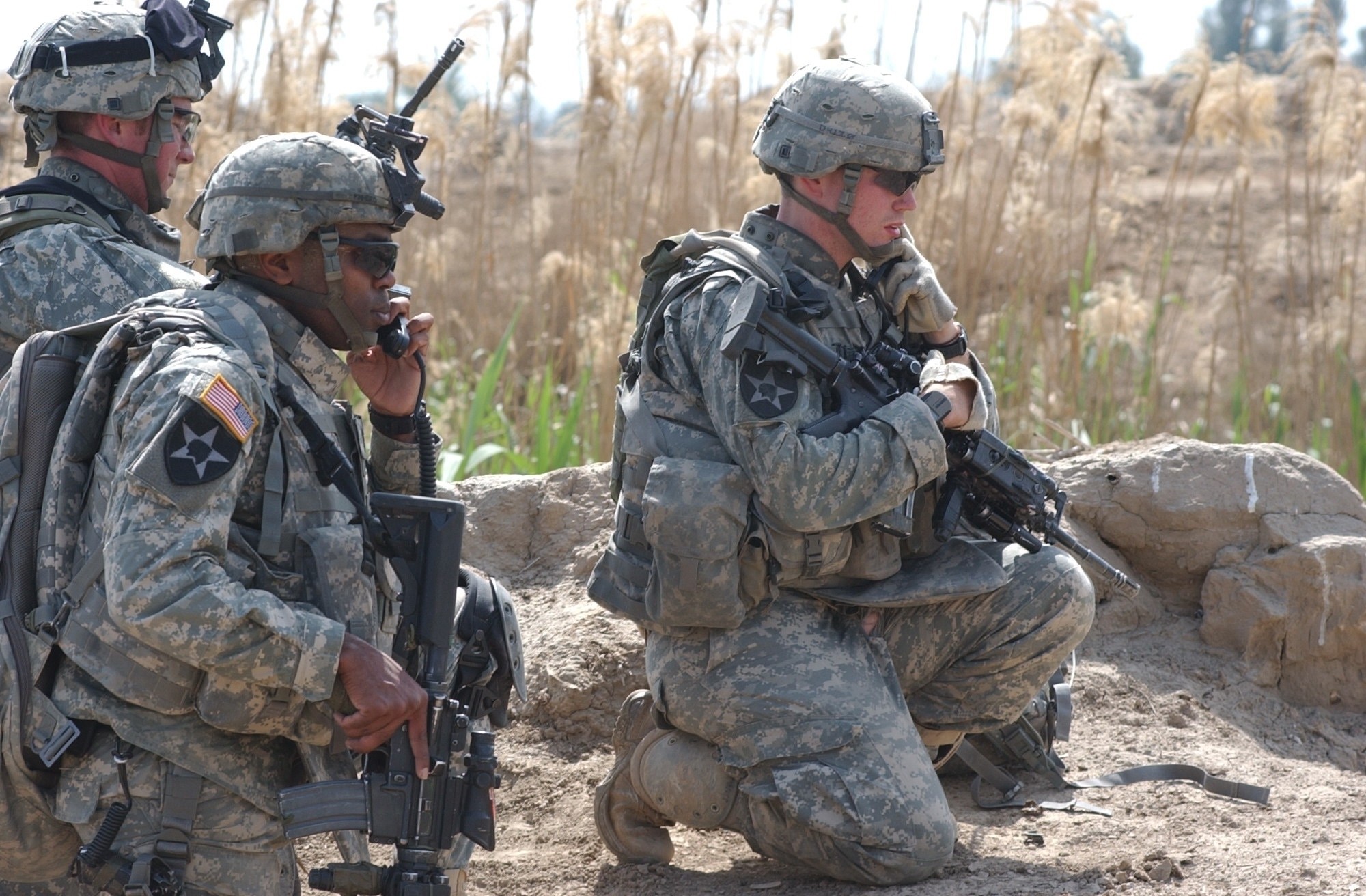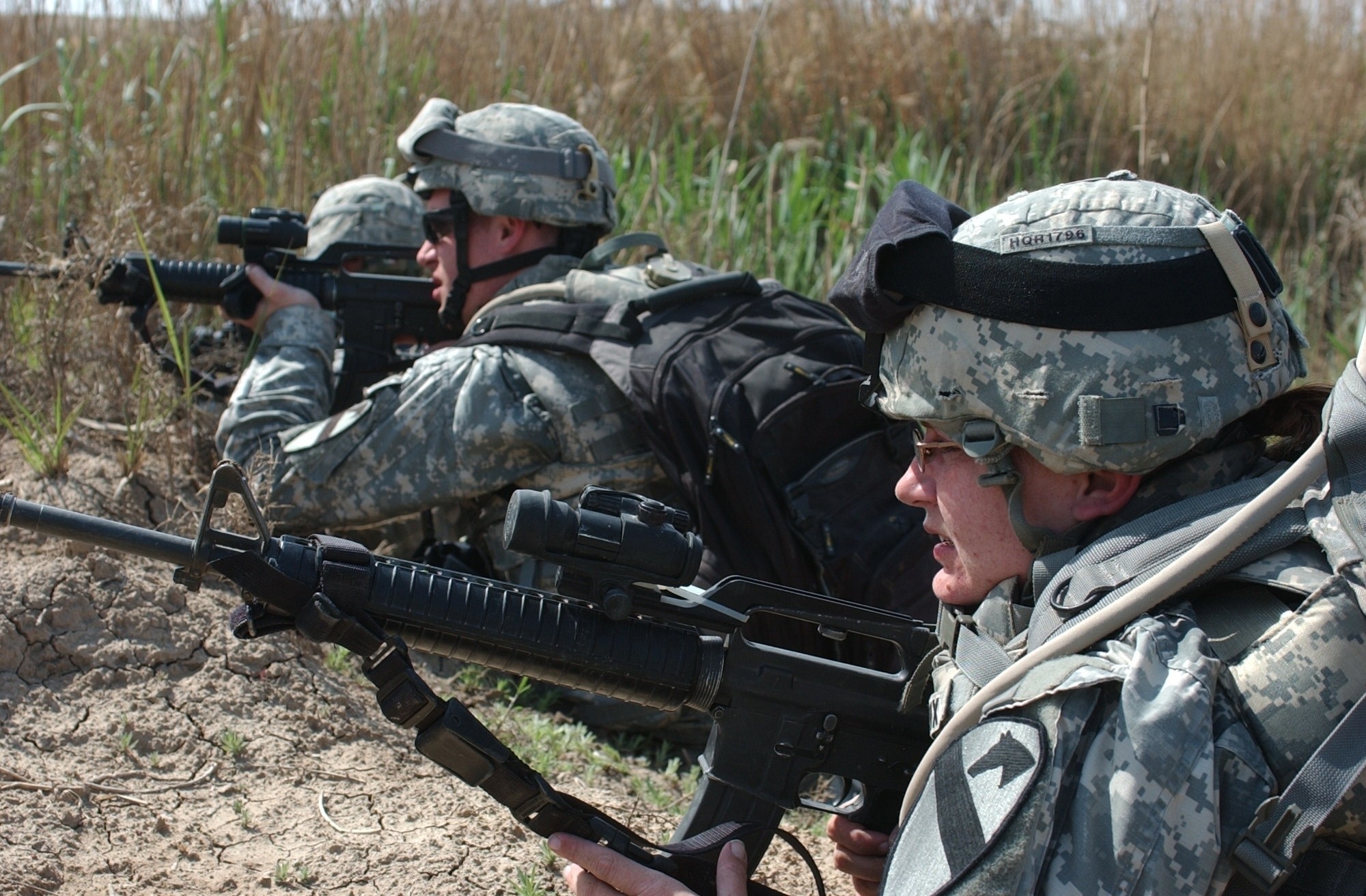WASHINGTON (American Forces Press Service, March 22, 2007) - Anti-insurgent operations conducted by U.S. and Iraqi security forces as part of Operation Law and Order and recent meetings with area tribal leaders have combined to reduce the violence in and around Iraq, and has enabled reconstruction to proceed throughout the country.
Iraqi Army troops have conducted about a third of the anti-terrorist operations in southern Baghdad since Operation Law and Order commenced in mid-February, Col. Michael Kershaw, commander of the 10th Mountain Division's 2nd Brigade Combat Team, told reporters at a Baghdad news conference.
"Both coalition and Iraqi forces have continued to conduct security operations and these operations have been highlighted by a number of recent successes," Kershaw said. Success achieved against terrorists who'd once operated in the area, he noted, has enabled Iraqi police to move into areas where they didn't operate before.
Additionally, U.S. and Iraqi military leaders have attended meetings with regional sheikhs, the U.S. officer noted, which in concert with reconstruction efforts involving schools, roads and sewage projects, have also assisted in reducing the violence.
"There is a big reduction of violence in southern Baghdad because of the success of the military operations," concurred Col. Ali Jassem, commander of the 4th Brigade of the 6th Iraqi Army Division. Southern Baghdad was a hotbed of insurgent activity just two years ago, he noted.
However, Iraqi Soldiers stationed in southern Baghdad have "conducted and supervised many attacks against the terrorists, which led to the capture of many of them," Jassem said. Those operations, the Iraqi colonel added, also resulted in the seizure of many large enemy weapons caches containing rockets, mortar rounds, medium and light weapons and explosives.
Also, Iraqi troops supported by U.S. forces "secured the area" without incident during a recent religious pilgrimage, Jassem said, that had passed through southern Baghdad and the nearby town of Mahmudiyah.
"Mahmudiyah is a very important site," Mouayed Fathel al-Ameri, the town's mayor, said at the news conference, because it is the gateway into Baghdad from the south. Al Qaeda terrorists once operated in the area south of Baghdad, he noted.
Today, "the security forces have struck down the al Qaeda terrorists in this area and we achieved good results, the mayor said.
The Iraqi colonel noted that Operation Law and Order, called Fardh al-Qanoon in Arabic, is putting the squeeze on terrorists who'd previously operated in and around Iraq's capital city.
"Now, the pressure of Fardh al-Qanoon pushed the terrorists to flee away from Baghdad, but the security forces outside Baghdad conducted good operations, which pressurized the terrorists," Jassem said.
Three months ago, terrorist-conducted mortar attacks numbered between 400 and 500 monthly, Jassem said. Today, he said, such attacks number around 20 each month.
The mayor of Mahmudiyah said talks with local tribal leaders have also contributed to the reduction of violence. The sheikhs were urged to pitch in and help "identify the bad guys who try to destroy Iraq," the mayor pointed out.
"We need the unity and support of all the tribes," the mayor emphasized. "With the support of the tribes, we can achieve good results."
<b>Reconstruction Proceeding Despite Challenges</b>
The reconstruction effort under way in Iraq is one of the most extensive and challenging of all time, but also one of the most important, the deputy commander of the U.S. Army Corps of Engineers told the Senate Committee on Homeland Security and Governmental Affairs today.
Maj. Gen. Ronald Johnson, who served as the first commander of the Corps' Gulf Region Division, reported that the Iraqi reconstruction program "is yielding positive, tangible results every day and has significantly improved the lives of the Iraqi people."
Despite a challenging and often hostile work environment, Johnson reported that some 4,000 Corps of Engineers Soldiers and civilian employees have seen more than 2,800 projects completed. "We have completed 13 refurbished hospitals that can serve 5,500 patients a day, restored water treatment facilities benefiting over 2.3 million Iraqis, completed over 250 border forts, helping to secure more than 2,000 miles of Iraqi borders, completed over 800 new or renovated schools serving 325,000 Iraqi children, and have increased electric power generation, benefiting 1.3 million homes," he said.
Meanwhile, the Corps helped increase crude oil production by 300,000 barrels a day over pre-war levels, Johnson told the committee.
At least 80 percent of the projects assessed by the Special Inspector General for Iraq Reconstruction (SIGIR) met contract specifications, and SIGIR's most recent quarterly report noted that about 90 percent of Army Corps projects met contract requirements, he said.
But successful projects don't tend to be the ones that get attention, Johnson said. He acknowledged that some projects have run into problems, but said they're corrected as quickly as possible once identified, with lessons learned applied across the board.
"The people of the United States expect us to do our job right, on time and on budget," he said. "We share that same expectation."
Johnson said the Corps of Engineers' experience with Iraqi reconstruction is helping it develop as a "stronger, more capable organization." He praised members of the Corps and gave special tribute to the 12 seriously wounded and two killed while supporting reconstruction efforts.
Those within the organization "know that success in Iraq and the global war on terror depends on our ability to help the Iraqi people build the infrastructure of a strong and functional democracy," he said.
"Certainly the work in Iraq is challenging and difficult," he said, "but reconstruction efforts are a vital component to our campaign in Iraq and in Iraq's progress toward stability and peace."
Johnson joined Stuart Bowen, special inspector general for Iraq reconstruction, David M. Satterfield, the State Department's senior advisor and coordinator for Iraq, and Mark Ward, senior deputy assistant administrator for the U.S. Agency for International Development's Bureau of Asia and the Near East in testifying on the reconstruction effort.
Bowen, recently returned from Iraq, told the committee he is "cautiously optimistic" that the Baghdad security plan is yielding successes that will enhance reconstruction efforts. That's the first time in the last 20 months he's returned from Iraq with this positive sense, he said.
<b>Iraqi Police Working Independently</b>
The 200,000 coalition-trained Iraqi policemen and women are an independent force, a top military official told reporters at the Pentagon today.
The force is composed of 135,000 provincial policemen in Iraq's 18 provinces, 24,000 national policemen focused mainly on Baghdad security, and more than 30,000 employees of the Department of Border Enforcement, which polices the country's ports of entry and border forts.
"From what I see here on the ground, they are in charge, ... and we are making progress," said Army Maj. Gen. Kenneth Hunzeker, the commanding general of the Civilian Police Assistance Training Team (CPATT).
Hunzeker, who previously served on the Joint Staff and commanded the 1st Infantry Division as it returned to the United States from Germany, assumed control of Multinational Security Transition Command Iraq's CPATT in October.
Since 2003, Hunzeker said, coalition forces have built or refurbished nearly 500 police stations, 21 national police and emergency response units, 272 border sites, and 11 of the 13 academy sites.
He said that the "no nonsense" approach of Iraqi Interior Minister Jawad Bolani, who discharged 3,000 members for various reasons, has limited "sectarian behavior" from infiltrating the ranks.
"Today, the Iraqis are in control of their police stations and their academies. The Iraqi police have made significant progress during the past four years," he said. "What I see in how (Iraqi police forces) are organized and equipped for ... Fardh al-Qanoon, they are set up for success."
Fardh al-Qanoon, an Iraqi phrase that means "Enforcing the Law," is the Baghdad security plan that was announced Feb. 13 and includes initiatives to split the Iraqi capital into 10 districts and create joint security stations in the city.
"When you look at the architects of the Fardh al-Qanoon, (you see) that every zone is given an Iraqi army unit paired with an Iraqi police unit to take advantage of the capabilities of both those organizations," he said.
This structure, which allows "synergistic teams" to fight together, is the nascent Baghdad security plan's true value, he said.
"They've task-organized within each one of those sectors, to take the advantages of the strengths and weaknesses of both organizations," Hunzeker said. "In one capability, where you need a police force to do a mission, they have it, and one capability where you need an Army force to do the mission, they have it."
Hunzeker said that Iraqi police officers, or shertas, who have volunteered for one of the toughest jobs in the country, "clearly want a safe and secure Iraq."
But echoing comments by Gen. David H. Petraeus, Hunzeker said that progress, "is going to take months, not weeks and not days."




Social Sharing